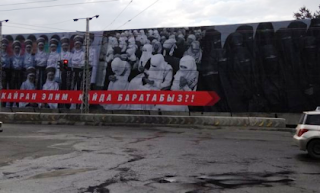Campaign to get rid of fully-veiled women in the streets of Kyrgyzstan has intensified in the last couple of days as President Almazbek Atambayev announced that women can become radicalized to become terrorists if they put on Islamic dress.
Speaking at a press conference a few days ago, President Atambayev also attacked those in his country, where 80 percent of the population is Muslim, who are critical of women who wear more revealing outfits.
His remarks followed several weeks of controversy over government-sponsored hoardings or banners put up in the streets of the capital Bishkek to try to dissuade Kyrgyz women from wearing Islamic clothing, notably the hijab, niqab and burka, ahead of a visit to the country by German Chancellor Angela Merkel in mid-July.
The hoardings, which, like the president's remarks, have offended many, showed contrasting photos: one side shows women wearing the traditional nomadic clothing of Kyrgyzstan, the other shows women in niqabs and burkas, the full veils worn by some Muslim women. The caption underneath said: "Poor people! Where are we heading to?"
Addressing criticism of the design, President Atambayev said: "When we erected banners some smart people appeared and started pointing at miniskirts. Our women have been wearing miniskirts since 1950s, and they never thought about wearing an explosive belt.
"You can wear even tarpaulin boots on your head, but do not organise bombings. This is not religion. Let them wear even miniskirts but there must not be any blasts."
He portrayed the wearing of some Islamic clothing as not only out of step with contemporary Kyrgyz national culture but also potentially dangerous.
"Terrorists are insane people," he said. "Clothes also can change one's thoughts sometimes. When we were searching for prisoners who had escaped a detention center, Melis Turganbayev (the former interior minister) came to me and said that they had been eavesdropping on telephone conversations of wives and mistresses of criminals. Their wives and mistresses wore sacks on their heads and they wanted to organize bombings.
"If you do not like Kyrgyzstan you can leave our country and go wherever you want. We can pay your travel expenses, even to Syria," the president said - an apparent reference to his government's claim that around 350 Kyrgyz citizens are fighting with jihadi groups in Syria and Iraq.
Speaking at a press conference a few days ago, President Atambayev also attacked those in his country, where 80 percent of the population is Muslim, who are critical of women who wear more revealing outfits.
His remarks followed several weeks of controversy over government-sponsored hoardings or banners put up in the streets of the capital Bishkek to try to dissuade Kyrgyz women from wearing Islamic clothing, notably the hijab, niqab and burka, ahead of a visit to the country by German Chancellor Angela Merkel in mid-July.
The hoardings, which, like the president's remarks, have offended many, showed contrasting photos: one side shows women wearing the traditional nomadic clothing of Kyrgyzstan, the other shows women in niqabs and burkas, the full veils worn by some Muslim women. The caption underneath said: "Poor people! Where are we heading to?"
Addressing criticism of the design, President Atambayev said: "When we erected banners some smart people appeared and started pointing at miniskirts. Our women have been wearing miniskirts since 1950s, and they never thought about wearing an explosive belt.
"You can wear even tarpaulin boots on your head, but do not organise bombings. This is not religion. Let them wear even miniskirts but there must not be any blasts."
He portrayed the wearing of some Islamic clothing as not only out of step with contemporary Kyrgyz national culture but also potentially dangerous.
"Terrorists are insane people," he said. "Clothes also can change one's thoughts sometimes. When we were searching for prisoners who had escaped a detention center, Melis Turganbayev (the former interior minister) came to me and said that they had been eavesdropping on telephone conversations of wives and mistresses of criminals. Their wives and mistresses wore sacks on their heads and they wanted to organize bombings.
"If you do not like Kyrgyzstan you can leave our country and go wherever you want. We can pay your travel expenses, even to Syria," the president said - an apparent reference to his government's claim that around 350 Kyrgyz citizens are fighting with jihadi groups in Syria and Iraq.

